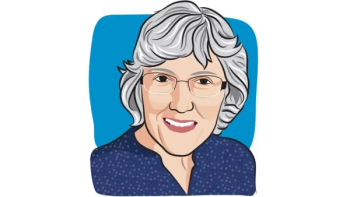
Don't Let Ovarian Cancer Take Away Your Sex Life
Many patients with cancer don't hesitate when discussing side effects like fatigue, nausea and neuropathy with their health care provider; however, there is often silence when it boils down to the sexual side effects of their treatment.
Many patients with cancer don't hesitate when discussing side effects such as fatigue, nausea and neuropathy with their health care provider. When it comes to sexual side effects from their treatment, patients are often silent.
Sex ranks among the top five unmet needs of cancer survivors. And, compared to the non-cancer population, the ovarian cancer population’s prevalence of sexual dysfunction is 30 to 100 percent, said Amy Siston, Ph.D., during her presentation at the 20th Annual Ovarian Cancer National Conference held in Chicago July 8-9.
What kind of sexual side effects are women with ovarian cancer up against?
What strategies do you recommend for patients who are experiencing this?
The clinical psychologist from University of Chicago Medicine sat down for an interview with CURE to discuss the specific sexual issues that women with ovarian cancer face after treatment and how to address them through therapy.Many of the patients because of surgery like oophorectomy — a surgical procedure to remove one or both ovaries — will, if they haven’t gone through menopause already, go through menopause very quickly. It’s almost like overnight menopause. They will experience things such as decreased interest in sexual function, vaginal dryness and difficulty to become aroused, which can then lead to painful intercourse.It’s important for patients to ask their doctors for help or discuss this with their doctors. Many times, the physicians or providers may not be addressing this specifically with a patient. Typically, with diagnosis, patients are focused on survival and getting treatment started, and sexual function is kind of put to the side.
When they start to feel better and resume more normal activities, sexual function is one of those things where they say, “Hey, we’re not having intercourse anymore. We’re not intimate anymore. I’d like to proceed and talk about the issues and how we can go forward.” I think that’s the time when people recognize that this has been a problem and what can we do about it.
Do you have any tips for communicating this issue?
Is there any kind of financial barrier to getting help for sexual-related side effects of cancer?
So, first, going to a provider and, hopefully, a provider will have those resources available. The American Cancer Society is a great resource and various ovarian cancer websites will have those resources, too. Getting in treatment and speaking with a therapist that specializes in this area is the way to go.Think about questions that you want to ask in advance and write them down. Then go to your provider with those questions and make sure your questions are heard. Those are real concerns and intimacy is a huge part of a patient’s life, of a couple’s life, and it really needs to be addressed. Be assertive. Sex therapists typically work in the same mental health services, so that’s usually covered by insurance. A lot of the cancer support centers that are available will have services and support resources for free. They can find us — sex therapists who focus in oncology — at most medical centers.
We sometimes hear patients say, "I lost my sexual desire, but I thought it was all in my head." Can you discuss this?
It is very important. I will meet with patients first, ask them if they have a partner and if their partner is willing to come in. You can often see a sigh of relief on their faces just providing them with the education of why this is going on, what can be done about it and what your role is in this. This is something that they face together as a unit rather than as an individual. Then, going forward, I work with them as a unit on how to build that intimacy again and how to build the part of their relationship that maybe was put aside.Patients will say, “I was told that was normal. That happens. That’s part of aging. That’s part of menopause.” And yes, it is. However, it doesn’t mean that sexuality must be eliminated. Desire is lower [priority than] treatment, from side effects of medication and from any number of things, but there are certainly ways with therapy to build desire again. Even if desire is not present upfront, like the instinct maybe when patients were younger, there is no reason why that can’t be built to a level where patients and their partners are comfortable with that again.



